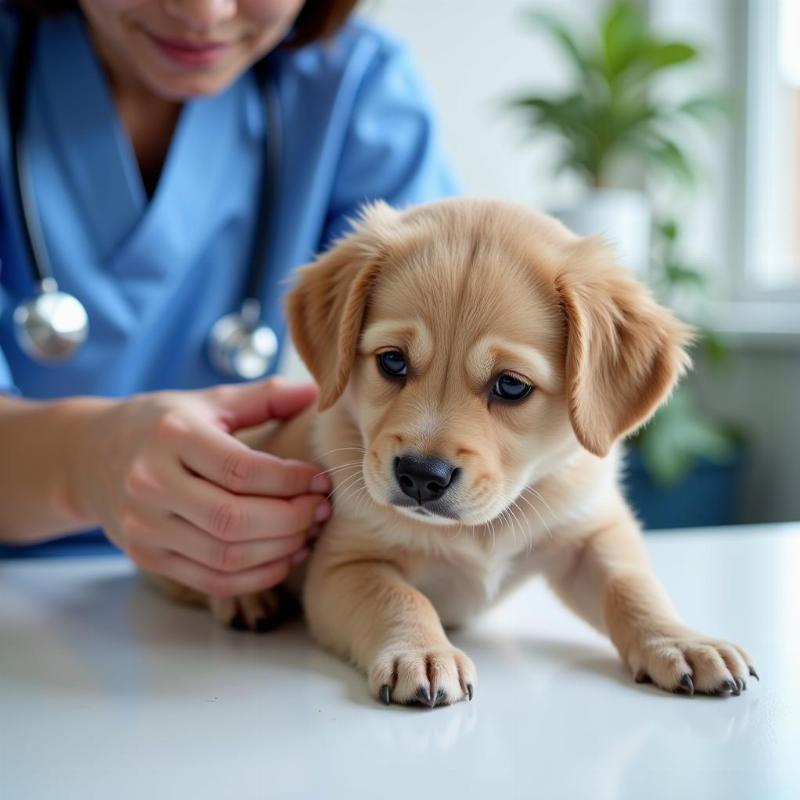Runt of the litter dog often evokes images of a tiny, frail puppy struggling to keep up with its siblings. While being the smallest in the litter can present some challenges, it doesn’t automatically mean the runt will be sickly or have a lower quality of life. This article explores what it means to be the runt, debunks common myths, and provides valuable guidance for caring for these special pups. We’ll discuss everything from health considerations to nutritional needs, helping you provide the best possible start for your runt of the litter dog.
Choosing to bring a runt of the litter dog into your home can be a rewarding experience. These smaller pups often possess endearing personalities and can bring just as much joy as their larger siblings. However, it’s essential to understand the potential challenges and be prepared to provide extra care and attention.
What Does “Runt of the Litter” Actually Mean?
Being the runt simply means the puppy is the smallest and often the weakest of the litter at birth. This can be due to various factors, including limited access to resources in the womb, genetic predispositions, or even illness. It’s important to note that “runt” isn’t a scientific term, but rather a common descriptor.
Common Misconceptions about Runts
Many myths surround runt of the litter dogs. Some believe they are inherently unhealthy, destined for a life of medical issues. This is not always the case. While runts may be more susceptible to certain health problems early on, with proper care and nutrition, they can grow into healthy, thriving adult dogs. Another misconception is that runts are always smaller than average. While they often remain smaller than their littermates, they can sometimes reach a typical size for their breed.
Health Concerns for the Runt of the Litter Dog
Runts can be more prone to health issues like hypoglycemia (low blood sugar), hypothermia (low body temperature), and failure to thrive. It’s crucial to monitor them closely for signs of weakness, lethargy, or difficulty nursing. Regular veterinary checkups are vital for early detection and intervention.
 Veterinarian Examining a Small Puppy
Veterinarian Examining a Small Puppy
Nutritional Needs of a Runt
Runts may struggle to compete with their siblings for food. Supplementing their mother’s milk with puppy formula, especially in the early weeks, can ensure they receive adequate nutrition. Consult with your veterinarian to determine the appropriate formula and feeding schedule. As they grow, providing a high-quality, easily digestible puppy food is essential for supporting healthy development.
Providing Extra Care and Attention
Runts often benefit from a warmer, more protected environment. Providing extra bedding and keeping them away from drafts can help regulate their body temperature. They may also require more frequent feedings and closer monitoring for signs of illness. Early socialization is crucial for all puppies, and runts are no exception. Expose them to various sights, sounds, and experiences to help them develop into well-adjusted adults.
“Early intervention is key when it comes to caring for the runt of the litter,” says Dr. Emily Carter, DVM, a veterinarian specializing in canine care. “Regular vet visits and attentive monitoring can significantly improve their chances of thriving.”
“Don’t underestimate the resilience of these little pups,” adds Dr. Carter. “With the right care and attention, they can grow into loving and healthy companions.”
Conclusion
Adopting a runt of the litter dog can be a fulfilling experience. While they may require extra care and attention, especially in their early weeks, these special pups can bring immense joy to their families. By understanding their unique needs and being prepared for potential challenges, you can give your runt the best possible chance to live a long, healthy, and happy life. Remember, with proper care and a loving environment, the runt of the litter dog can flourish and become a cherished member of your family.
FAQ
- Is it more expensive to own a runt of the litter dog? Potentially, as they might require more veterinary care early on.
- Do runts always stay small? Not always, some catch up to their siblings, while others remain smaller.
- Are runts more prone to behavioral problems? Not inherently, proper socialization is crucial for all puppies.
- How can I tell if my runt is healthy? Regular vet checkups and monitoring for signs of weakness or lethargy.
- What kind of food should I feed my runt? High-quality, easily digestible puppy food, potentially supplemented with formula early on.
- Can runts live as long as other dogs? Yes, with proper care, they can have a normal lifespan.
- Where can I find a reputable breeder if I’m interested in a runt? The American Kennel Club is a good resource for finding reputable breeders.
Beautdogs.us is your premier resource for dog lifestyle and care in the US. We offer expert advice on dog breeds, nutrition, training, and much more. Our mission is to empower dog owners with the knowledge and resources they need to provide the best possible care for their canine companions. Whether you’re a seasoned dog owner or just starting out, Beautdogs.us is your trusted source for all things dog-related. Contact us today for expert advice and support! Email: [email protected], Phone: +1 501-555-7529. Connect with us at Beautdogs.us.